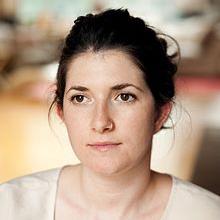By JULIA HABLAK, Staff Writer
Novelist and essayist Claire Vaye Watkins joined Tri-Co students and faculty on Wednesday, Nov. 15 for the third installment of the Bryn Mawr 2017-2018 Reading Series.
The author brought her books, “Battleborn,” a short story collection, and “Gold Fame Citrus,” her debut novel. Unlike this year’s previous Reading Series authors, who chose to read from their published works, Watkins shared one of her current works-in-progress. “My LP – my Long Project,” she called it.
Creative Writing Professor Dan Torday introduced Watkins as an author who’s “not afraid to begin with a bang.” Her “Long Project” is no exception—every sentence seems to jump off the page.
Her latest work is largely autobiographical, featuring epigraphs from the Edinburgh Postnatal Depression Scale, a 10-item questionnaire designed to identify postpartum depression.
Watkins read loudly, clearly, comically, and emphatically. The room was charmed, with the audience hanging onto Watkins’ words, their eyes practically glued to the podium. Every other sentence was met with roars of laughter.
At one point, Watkins even sang. It wasn’t beautiful singing, but her assertiveness was delightful.
After the reading, Watkins opened the floor to questions. One student asked how much an author should reveal about herself in her writing. Watkins responded that, while she does not censor her opinions, she never allows another person to learn about her feelings toward them for the first time through her fiction. She makes sure to let the individuals who appear in her writing read the work before it is published.
Another student asked about Watkins’ editing process—more specifically, how to find the patience to edit a work without just deleting it in disgust. Watkins explained that when the “honeymoon period” is over, and the amazing work that was in your mind becomes a first draft, you suddenly hate it.
However, Watkins warned against deleting those early drafts, saying that it is better to have words on a page that you can edit rather than nothing at all. The feeling you get after having written something – that idea that you should “never do this again,” is, for Watkins, part of the process.
Watkins holds her writing to particular standards. She is constantly considering the artistry of her writing. The goal, Watkins explained, is not to make herself look good or make someone else look like a jerk. Rather, she and her family examine her work through the question: “Is it art?”
It’s a tough question, one Watkins has partially addressed in her essay “On Pandering,” which came up in the Q&A session. In her essay, given as a lecture at the 2015 Tin House Summer Writers’ Workshop, Watkins discussed her realization that she wrote her short story collection “Battleborn” for white males.
Watkins suggested that this wasn’t a conscious decision, but rather the effect of gaslighting by the “white supremacist patriarchy.” At the Q&A, she elaborated on this point, explaining that she doesn’t hate the stories she wrote in “Battleborn.” In fact, Watkins is very proud of those stories – but she wants to be more conscious of what narratives she chooses to tell.
Stories about marginalized groups, the stories that Watkins thought she was writing in “Battleborn”, are the ones she wants to focus on now. Her new mission began to take shape in “Gold Fame Citrus,” a story in which character Luz, stranded in a post-apocalyptic wasteland, has to find a way to survive.
Watkins talked about some of the pushback she got concerning the decision to have Luz ask for a man’s help. People said they wished Luz could fend for herself. To those critics she replies, “Me too.”
Watkins admires mainstream characters like Katniss. At the same time, she is reluctant to impose her own wishes on her characters. She wants to write a situation true to the way she believes it would really play out, given the current social dynamic. It is a social dynamic that Watkins is slowly but surely helping to change.
Photo Courtesy of Bryn Mawr College.
